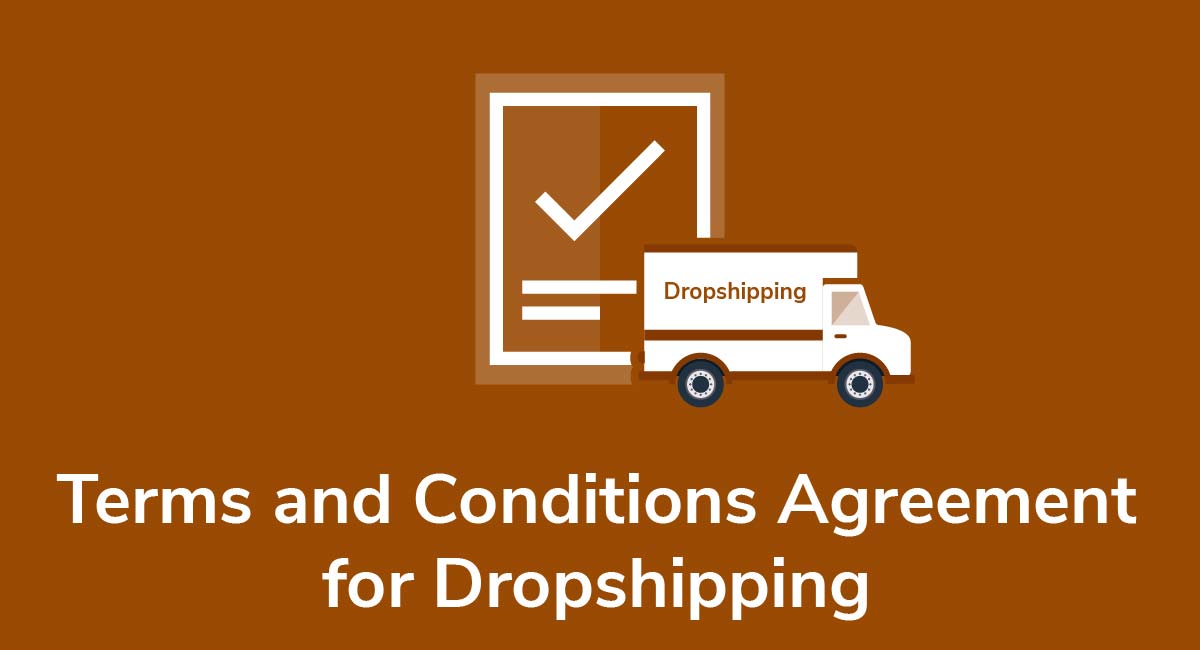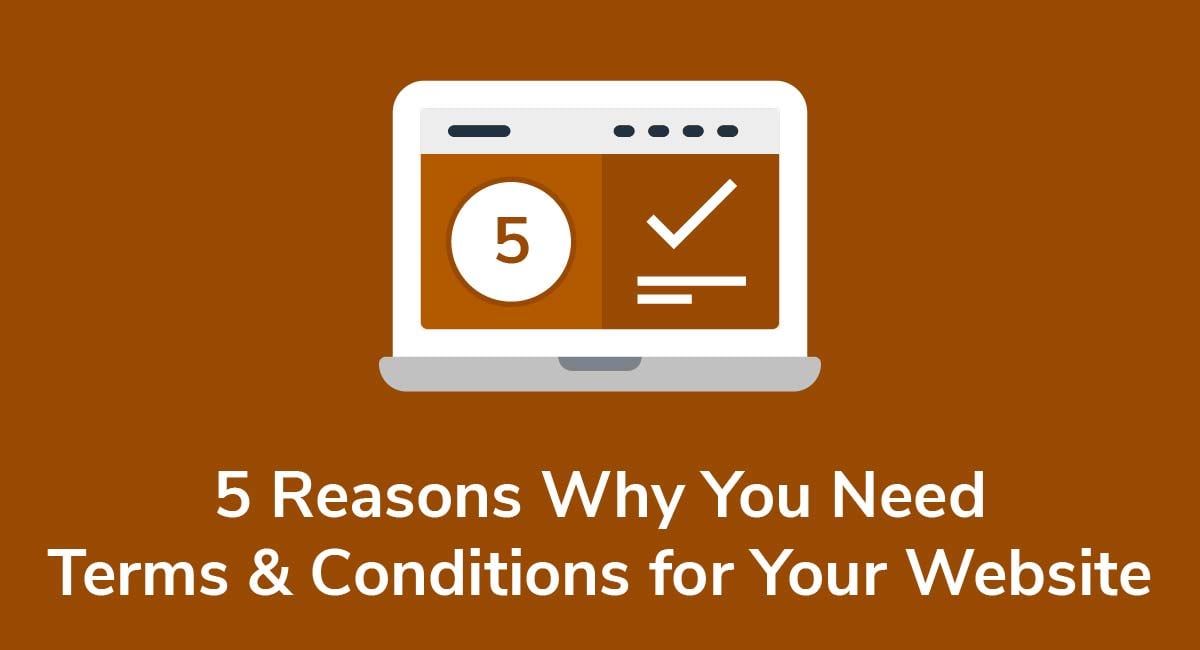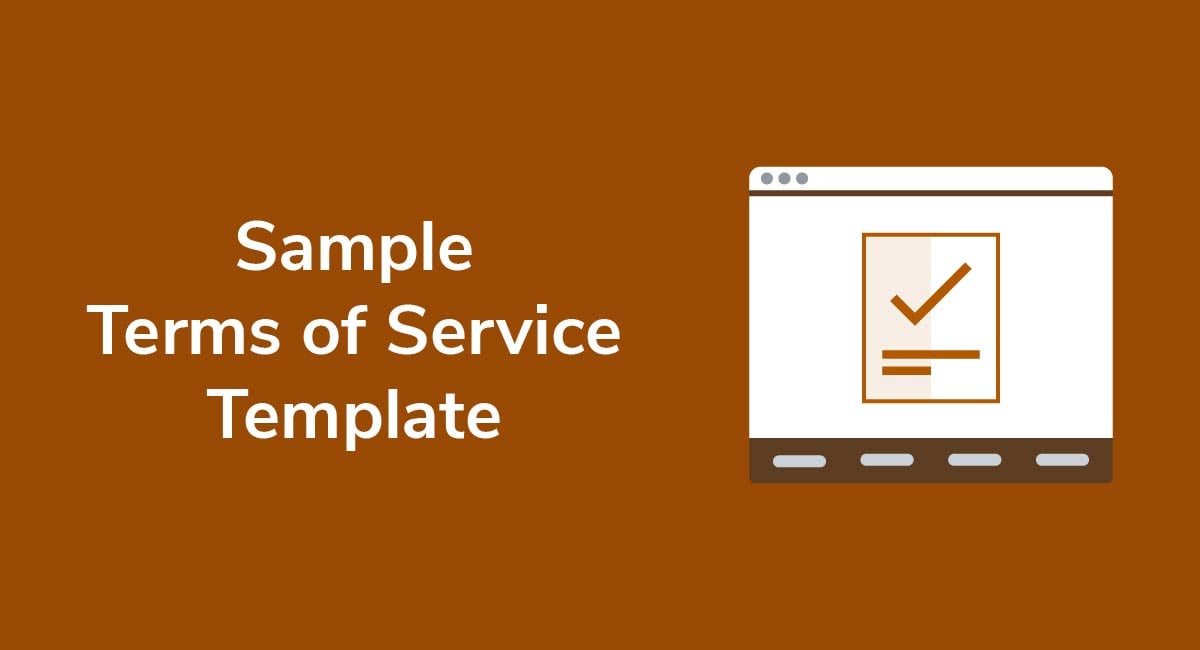Terms and Conditions for Free Trials
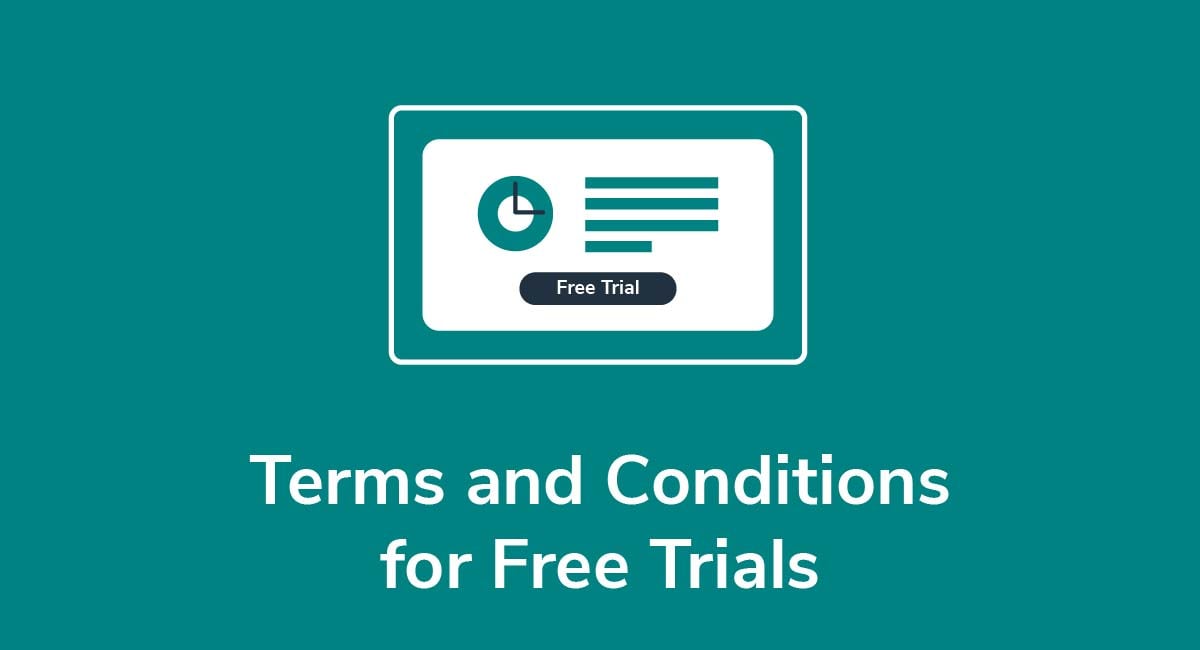
Free trials are effective promotional tools that can entice customers who prefer to try before they buy. Free trials may not involve financial transactions, but you still need to protect your business when you offer them by laying out trial-specific terms in your Terms and Conditions agreement.
In this article we'll look at why Terms and Conditions for free trials are so important, what to include in yours, and how to create, display and get agreement to one.
Need Terms and Conditions for your business? We can help you generate a customized Terms and Conditions agreement in around two-three minutes for free. Try our Terms and Conditions Generator and just follow these steps:
- Click on the "Create your Terms and Conditions today" button.
- At Step 1, select the where will you use your Terms & Conditions and click "Next step":
- Add information about your business:
- Select the country and continue to the "Next step":
- Answer the questions about your business practices and click "Next step" when finished:
-
Enter your email address where you'd like your agreement sent and click "Generate."

You're done! Now you'll be able to instantly access and download your new agreement.
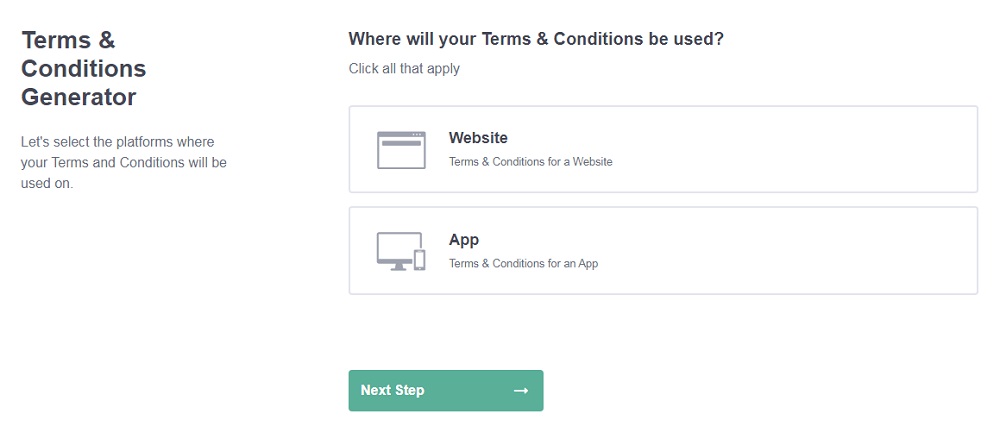
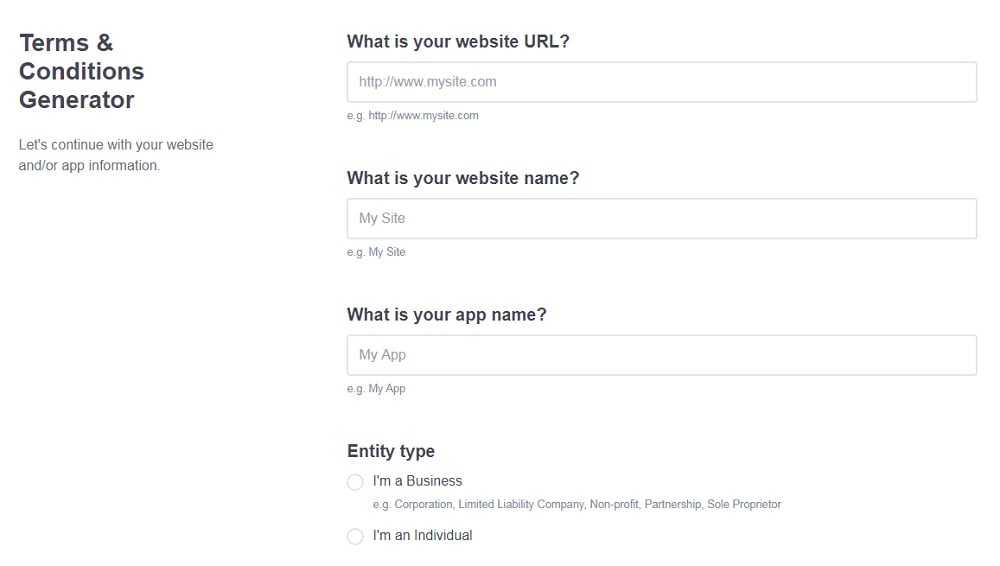
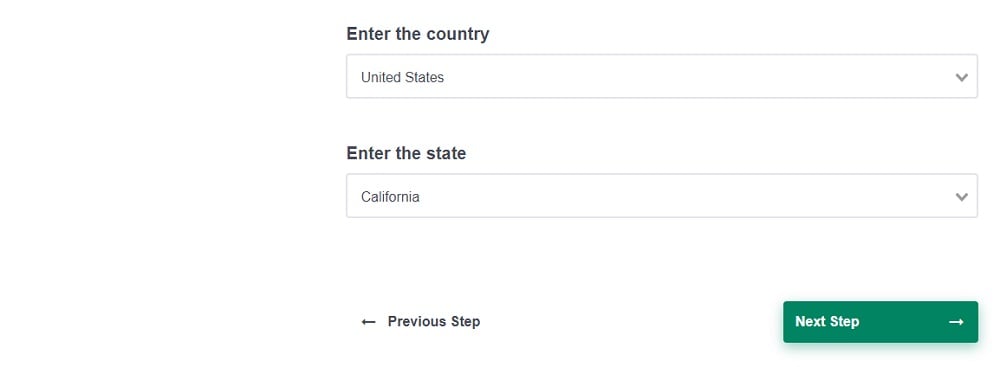
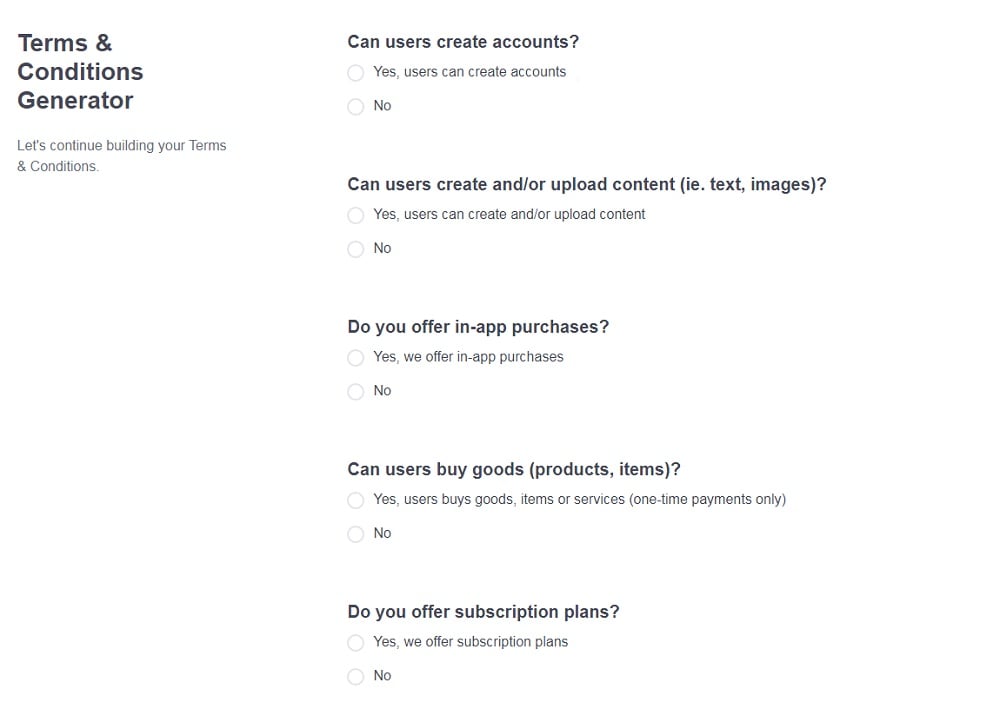
- 1. What is a Terms and Conditions Agreement?
- 2. Why Terms and Conditions are Important for Free Trials
- 3. How to Write a Terms and Conditions Agreement for Free Trials
- 3.1. Overview of the Free Trial Terms
- 3.2. Definitions
- 3.3. Restrictions and Prohibited Conduct
- 3.4. Term and Termination
- 3.5. Automatic Renewal, Billing, Cancellation, and Refunds
- 3.6. Governing Law
- 3.7. Intellectual Property
- 3.8. Disclaimer of Warranties and Limitation of Liabilities
- 3.9. Your Right to Modify the Terms
- 4. Displaying and Getting Consent for Terms and Conditions for Free Trials
- 4.1. Website Footer
- 4.2. Account Sign-Up Page
- 5. Summary
What is a Terms and Conditions Agreement?
A Terms and Conditions agreement is a contract between you and your customers or users in which you spell out the terms, guidelines, and restrictions associated with how they use your product, platform, or service.
Most Terms and Conditions agreements will include clauses on the following information:
- Limitation of liability and disclaimers of warranties
- What conduct is prohibited when using the site or service
- What the governing law is
- Information about intellectual property rights
- How accounts can or will be terminated
- Payment information, such as when billing occurs and how payments must be made
Why Terms and Conditions are Important for Free Trials

Establishing ground rules for free trials can give new users peace of mind that they're getting what they expect, and won't be blindsided by unpleasant surprises such as hidden costs and fees during what turns out to be a "free" trial.
Non-paying trial users must generally abide by the same rules as existing paying customers, but free trial offers usually have special conditions that need to be addressed.
If so, you may want to include the following in your Terms and Conditions:
- What product or service is included in the free trial offer
- When the offer expires
- How long the free trial period lasts
- Who's eligible to participate (and who isn't)
- Whether geographic or age restrictions apply
- What plan or subscription options users will have after the free trial ends
- How to opt out of or cancel the service to avoid fees after the trial ends
- How payment will be handled/when will billing occur after the trial period ends
How to Write a Terms and Conditions Agreement for Free Trials

When writing your Terms and Conditions agreement, you'll need to fine tune the specific content to your industry and business type, as well as the nature of your relationship with your users and customers.
However, most Terms and Conditions agreements include some or all of the following clauses.
Overview of the Free Trial Terms
You should clearly describe what your free trial entails. You can do this simply by giving a general overview.
GoDaddy does this in the Description of Service section found in its Free Trial Terms of Service:

In this example, GoDaddy lets users know that:
- Free trials are only available with qualifying purchases
- Users must have an account and a valid payment method to participate
- The company may withdraw or modify the offer at any time
Definitions
Free trial legalese may include terms and phrases that many users are unfamiliar with. Since this is often unavoidable, it's wise to include a list of terms and definitions.
In its Free-Trial Subscription Agreement, Datadog defines more than two dozen terms that are used throughout the document:
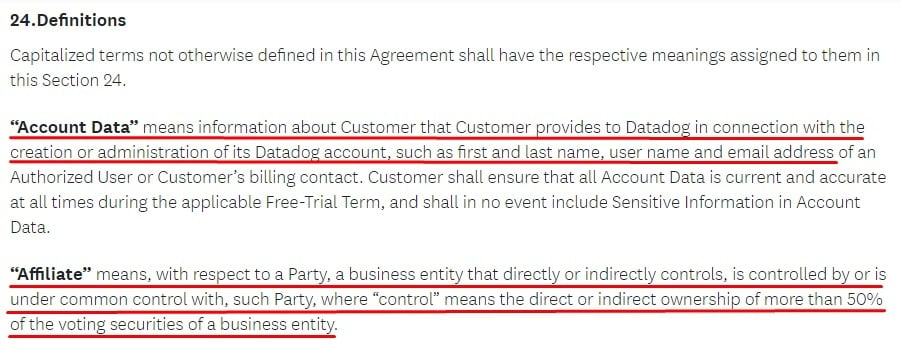
Restrictions and Prohibited Conduct
You should list specific restrictions and behavior that will be prohibited during the free trial period. This helps users know what they can and cannot do, while also helping protect your platform from abusive users.
In its Free Trial Service Agreement, PowerDMS restricts the following conduct:
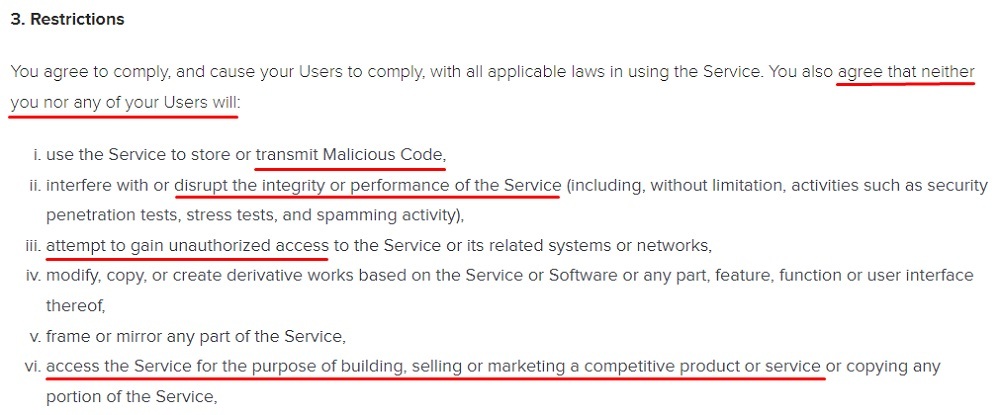
Term and Termination
Because free trials don't last forever, it's a good idea to let new users know how long they'll get free service and what options they'll have after the promotional period expires.
Though term lengths and termination procedures may be covered in two distinct clauses, Datadog lumps them together:

Automatic Renewal, Billing, Cancellation, and Refunds
Users considering a free trial will need to know what happens when the offer expires, how and when they can cancel service, and if they'll get a refund.
In this example, GoDaddy addresses automatic renewal, cancellation, and refunds in its Free Trial Terms of Service:

TIDAL includes a clause that addresses payments and billing information in its Terms and Conditions:
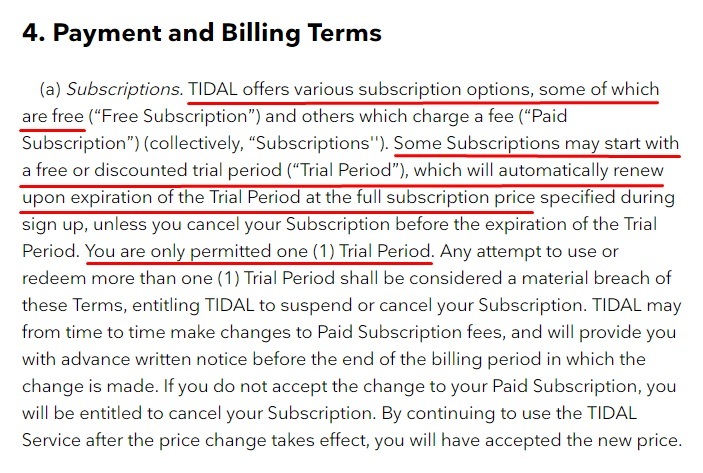
Sprouts lets users know that after the 14-day free trial offer for its Instacart home delivery program ends, billing will begin automatically and be charged annually or monthly:

Here's what interested customers should know about Sprouts' 14-day free Instacart Trial:
- Monthly or yearly membership will be charged after the trial
- Delivery is subject to availability
- Taxes, fees, and tips are extra
Governing Law
Governing law clauses establish which rules and laws will govern the agreement between you and your users.
Governing Law is generally determined based on where your business is headquartered. As such, it's particularly important if you have customers in different states or countries.
Here's how Konica Minolta addresses Governing Law and Jurisdiction in its Online Terms of Use:

In this example, use of Konica Minolta's website is governed by the laws of the State of New Jersey.
Intellectual Property
Intellectual property is a broad term that includes everything from undeveloped ideas and trade secrets to creative works.
Intellectual property is usually intangible, but it can play a big role in a business's competitiveness.
Since unauthorized use of a company's intellectual property is typically strictly prohibited, this should be addressed in your Terms and Conditions agreement.
Here's how Sprouts addresses intellectual property rights:

Sprouts lets users know that:
- Text, audio, and images are covered by intellectual property rights
- Web content is owned by the company and is protected by a number of property laws
- Unauthorized users may face prosecution
Disclaimer of Warranties and Limitation of Liabilities
Disclaimers of warranties and limitation of liability clauses let users know that you're not liable if your product or service doesn't meet their expectations or if your content contains errors. They help protect you and your business from legal issues if such situations arise.
Here's an example of a Disclaimer of Warranties from streaming television service Sling TV:

In its disclaimer of warranties, Sling TV lets users know that:
- They use its services at their own risk
- The company doesn't warrant the performance of any device
- No promises are made on behalf of third party companies or contributors
Here's the Disclaimers clause in Datadog's Free-Trial Subscription Agreement:

Your Right to Modify the Terms
Since businesses must constantly adapt to changing conditions, it's important to establish your right to modify them by informing users that you can update your Terms and Conditions at any time.
Here's how Safeway asserts its right to modify its terms:

Safeway also lets users know that they can find the date of the latest revision at the top of the Terms of Use page, and that it's their responsibility to review the terms regularly, such as for changes.
Displaying and Getting Consent for Terms and Conditions for Free Trials

To make your Terms and Conditions for free trials easy to find, you should place it in the following areas.
Website Footer
Your website footer is the go-to place where people look when they want more information about things, such as how your free trial offer works. Including a link here makes the link visible from any page of the site for maximum accessibility.
Here's how Simply Clean Diaper Service links its Terms of Use to its footer:

Account Sign-Up Page
Account sign-up pages are also good places to display or link to Terms and Conditions for free trials because new users can be prevented from moving forward in the registration process until they agree to your terms.
In the example below, new users signing up for a free trial must click on the green Continue button. By doing so, they agree to the company's Terms of Service and Privacy Policy:
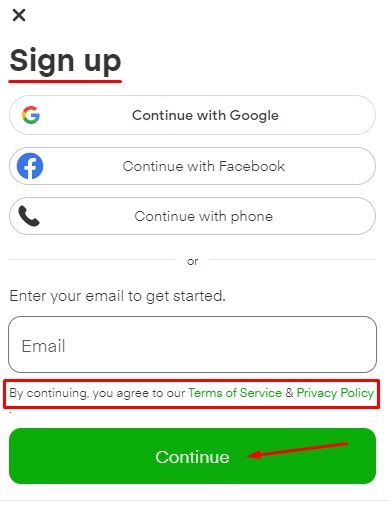
This is a popular means of getting consent because users must take an action like clicking a button or an I Agree checkbox that can be recorded and act as proof of consent if issues arise down the road.
Summary
A Terms and Conditions agreement is a contract between you and your customers or users in which you lay out the terms, guidelines, and restrictions that apply when they use your product or service.
Terms and Conditions agreements for free trials generally include the following clauses:
- Offer overview
- Definitions
- Restrictions and prohibited conduct
- Free trial term and termination
- Automatic renewal, billing, and refunds
- Governing law
- Intellectual property rights
- Disclaimers of warranty/limitation of liability
Terms and Conditions for free trials can be linked to from your website's footer, on account sign-up pages and elsewhere. Just make sure it's easily and freely accessible by anyone at any time.
